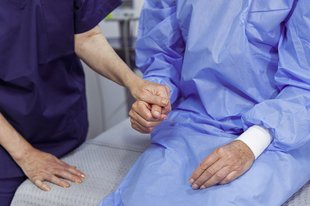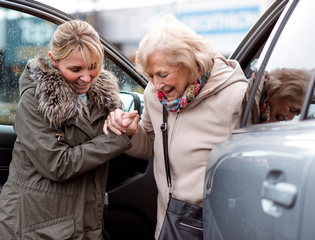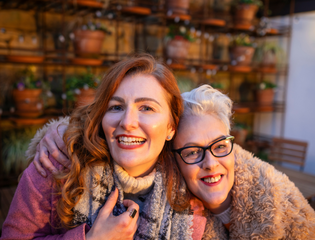Angela's story: "I truly hope that many more women will be able to receive this lifeline"
Angela, 60, from Walsall in the West Midlands, was diagnosed with stage 3 ovarian cancer in 2021. After a recurrence, she became platinum-resistant and started taking a drug called Elahere (mirvetuximab soravtansine). She tells us her story.

Nurse supporting patient - this is a stock image to maintain Angela's anonymity
"One day, I bent over a cot side to put my grandson to bed and experienced a sharp pain in my right side. It went, but appeared again a few days later. I mentioned it casually at a routine asthma review, and my GP asked me a few questions, then sent me for a blood test, which showed an elevated CA125. Luckily, I got put on the cancer pathway and saw a consultant, had an ultrasound and an MRI within two weeks. Unfortunately, I got my results on Christmas Eve. I went alone, thinking I'd be able to keep it from my children until the New Year.
No such luck - they could see it in my eyes, which broke my heart. All you want to do is protect your children, even if they are no longer babies.
I was diagnosed with high-grade serous ovarian cancer at stage 3 B/C. I had surgery to remove as much of the cancer as possible, as well as the standard platinum chemotherapy treatment, followed by a PARP inhibitor called niraparib. I have diverticulitis, which did play up a little bit on the carboplatin, and I did have some issues with blood pressure while taking niraparib.
After taking niraparib for 22 months, I had a recurrence last year. I had six infusions of carboplatin and Caelyx, but within six months, my CA125 was creeping back up, and I found out it was active again after a PET scan spotted small nodules growing.
Because this recurrence happened within six months of having platinum chemotherapy, I was classed as “platinum resistant”. I was told my option was to try carboplatin and Taxol weekly, but my oncologist organised special funding so I could actually access a brand-new drug that wasn’t yet available in England.
I started Elahere (mirvetuximab soravtansine) in June 2025. A sample of my tumour had to be tested first to see if I was a suitable patient. I have to travel 1 ½ hours each way to a major hospital in Birmingham to get this, but it feels worth it to me.
I work full-time for the NHS, and so far, I have been feeling absolutely fine taking Elahere. I’ve been really lucky: apart from my surgery in 2022, I’ve hardly had to have any time off work at all. I’ve got asthma, but I’ve actually reduced my inhaler usage since being on Elahere.
The only downside so far is that I have to travel every three weeks to have the treatment, though hopefully, if this drug is approved more widely, we’d be able to get it at our local hospitals instead.
It is an IV treatment through a drip, and it takes about three and a half hours. The first time was closer to six because the staff were being cautious, with it being a new drug, but also because they forgot it had to be taken out of the fridge in advance, which caused a bit of a delay.
I had to see the eye specialist before I started treatment, because some of the side effects found in the trials have been around the impact on your eye health. I already wear glasses, and she told me to just be aware of any changes or reactions to light, but I’ve not had any problems. She said I had slightly dry eyes to start with, even before the treatment, and gave me some drops to start using. I’ve been using them once a day and so far, have had no problems."
"Elahere’s effectiveness has overwhelmed me; it's outstripped my previous treatments."
After only three sessions, it’s brought my CA125 within normal parameters, and the CT results were amazing. I walked out of the consulting room with the biggest smile on my face since the beginning of this horrid cancer journey. The team at the hospital are very supportive and easy to talk to, and they tell me the truth, which I really appreciate.
Elahere has taken my fear of facing weekly chemo - three weekly cycles are manageable and allow me to work full time, as I'm single and have a mortgage to pay, and that’s the biggest financial worry I have. The second big plus is no cold capping to try and save my hair. I found that really difficult with chemo, and although I wore a wig when on previous treatments, I was always conscious of it, especially around my grandchildren. Going out socially was put on a back burner -call it vanity, but hair is so important to a woman, it's part of your identity. Take it away, and our confidence takes a beating. Elahere has given me a boost in confidence.
I truly hope that many more women will be able to receive this lifeline and get to enjoy life.
My GP tells me I’m a brave lady, and he asks me lots and lots of questions because he’s not got any other ladies on his books with my diagnosis.
I feel so, so lucky to have been given the chance to access this new drug. I admit I was hesitant at first, as when the registrar mentioned it, there were no information sheets to take home and digest. A month later, the information sheets I was able to get hold of (and Google) sold it, and my decision was made.
I truly hope that many others are able to access Elahere soon. I’m positive it's the right way to go and could help make a huge difference to thousands of women now and in the future.


